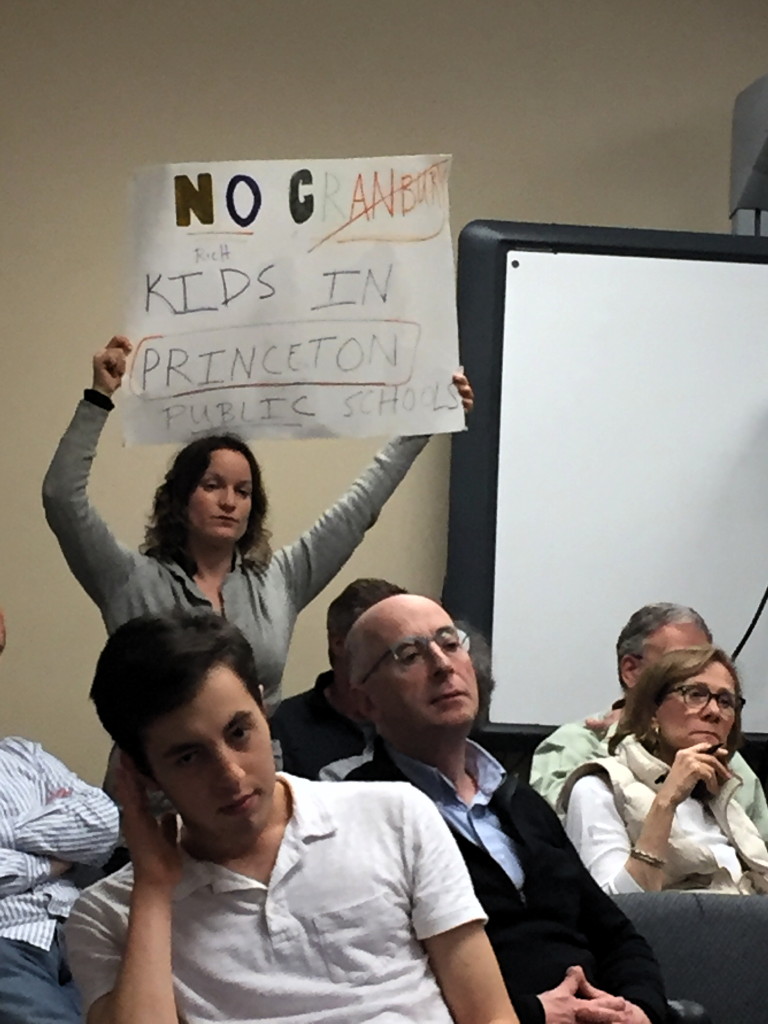The Princeton Public Schools Board of Education is facing increased public scrutiny about potentially renewing the send-receive relationship it has with Cranbury.
Residents, including a former Princeton mayor, spoke up at the board’s meeting May 22 to voice concerns about an arrangement that is due to expire at the end of June 2020. The two school districts are looking to extend the deal for 10 more years after the expiration date, so Cranbury students of high school age can continue to attend Princeton High School.
“When you commit to receiving Cranbury students, you commit to receiving all the growth in Cranbury students that there will be if there’s great building growth,” resident Alexi Assmus said during public comment.
“No one really knows what the Cranbury enrollments will be going forward,” said resident Joel Schwartz. “If, for whatever reason, Cranbury enrollments decline, Cranbury tuition payments to Princeton will decline. Princeton taxpayers will have to make up the difference.”
Resident Brian McDonald, however, said he favored continuing the arrangement, one that sees Cranbury pay $4.8 million in tuition that represents the second largest revenue in the Princeton school budget.
“The Cranbury relationship is a good deal financially for the district and the loss of revenue through the termination of the relationship with Cranbury would have significant negative consequences for our students and our taxpayers,” McDonald said.
For the upcoming 2018-19 school year, Cranbury representatives said this week that the tuition payment would be a little more than $4.9 million for 280 students.
“I think, again, that you need to defer any kind of decision on this,” resident Peter Madison told the board about the arrangement. “We don’t know what’s going to happen to their population and a 10-year-agreement sticks us for whatever happens to their population in terms of growth. They have more open land than we do.”
Patrick Simon, a former Princeton councilman, urged board members to “buy yourself enough time to actually improve the review of the agreement and the implications of it before moving forward with it.”
“You’ll be hard-pressed to find a taxpayer in this town, at this time, who supports the Cranbury students coming into our schools at this time,” said Cara Marcano, a resident who at times spoke up during the meeting and brought a handmade sign she held up that read “No Cranbury kids in Princeton public schools.”
Phyllis Marchand, a former Princeton Township mayor, touched on the environmental impact associated with the agreement. She said three school buses come into Princeton three times a day.
“That doesn’t include the number of parents who come and drive children after school,” Marchand said.
Later, one resident addressed Cranbury residents and Evelyn Spann, the Cranbury Board of Education member who serves as the representative to the Princeton Board of Education.
“For any Cranbury people who are watching and for Evelyn, please know you are really wanted in our schools,” said Julia Sass Rubin, the wife of Princeton school board member Greg Stankiewicz. “I am sorry for the anger and the misinformation or just honest disagreements.”
Spann declined to comment after the meeting.
Princeton officials took no action on the send-receive agreement this week; the deal was supposed to be on the agenda for the meeting for a first reading, but it was pulled, according to Board President Patrick Sullivan.
Typically, the board puts policies, not contracts, up for first reading – a chance for board members to make comments and changes.
Sullivan said after the meeting that lawyers are “still working out the details” and that board members need time to review the deal. He said it was not decided yet when the board might vote on the agreement.
“We’ll have to see when it comes up for a vote,” he said.
The board has delayed voting before. In April, officials raised the prospect of acting on the agreement that month, but that was pushed back.
“It’s complicated, it raises, obviously, a lot of emotions,” Sullivan said of the send-receive agreement. “We need to air all the issues and make sure people understand if we do it, why we do it, if we don’t do it, why we’re not doing it.”
The timing of the Cranbury debate comes with Princeton looking to put a $129.8 million referendum on the ballot in October to pay for improving facilities and other projects, including $56.5 million worth of work at the overcrowded high school.
Cranbury would contribute to paying off a portion of the debt service on projects at the high school.
In response to a reporter’s question, Princeton board member Dafna Kendal said this week she is concerned the district might lose support within the community for the referendum due to the opposition the Cranbury arrangement is generating.
“We proposed a (referendum) plan that we think is in the best interests of the students and the community,” Kendal said on May 23. “I’m worried that the needs of the district will be overshadowed by the discussion around Cranbury, because it’s really two separate issues.”

